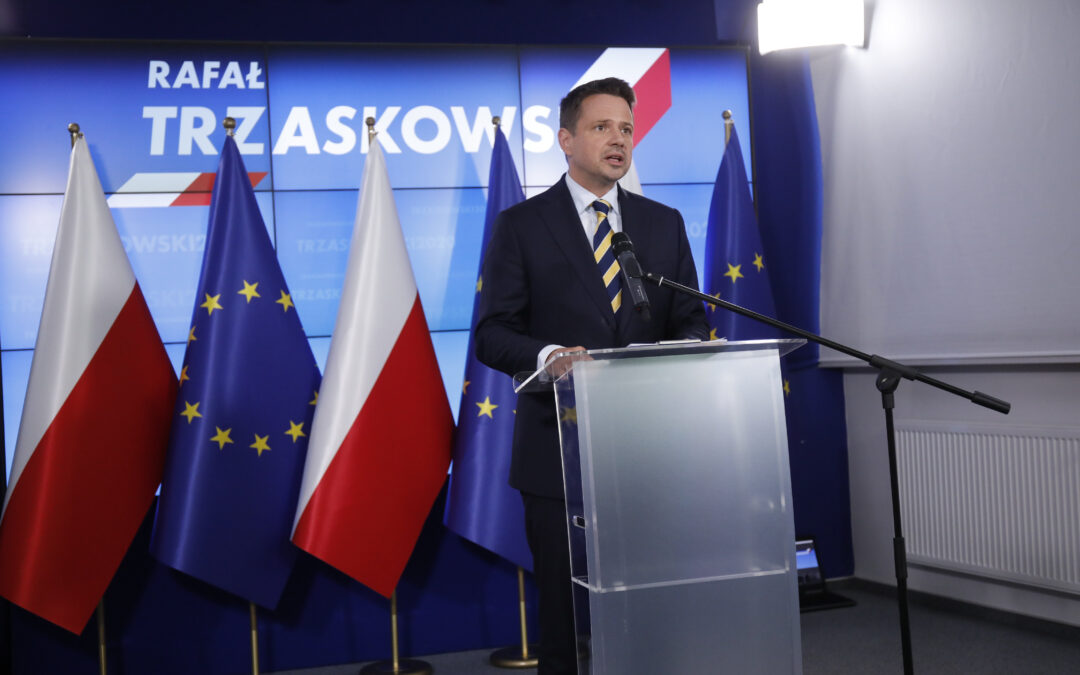The campaign team of defeated opposition presidential candidate Rafał Trzaskowski announced today that they will lodge official protests with the Supreme Court regarding Sunday’s election, following reports of voting irregularities and delayed postal ballots.
They have also launched a website to offer legal and logistical advice to any citizens that wish to submit a protest regarding the election before the deadline on Thursday.
Before the election, a number of doubts had been raised about the legality and constitutionality of how it was organised and conducted. One particular concern was the difficulties that some Poles abroad reported in registering for and receiving their postal ballots, which were compulsory for most overseas voters.
On Sunday, incumbent president Andrzej Duda, backed by the ruling national-conservative Law and Justice (PiS) party, narrowly won another five-year term against Warsaw mayor Trzaskowski, who represented the centrist Civic Coalition (KO).
“We are receiving receiving very worrying signals about the conduct of voting,” said KO MP Barbara Nowacka at a press conference to announce the legal challenge today.
.@CTomczyk : Najwięcej sygnałów o nieprawidłowościach dotyczy głosowania za granicą. Każda z tych nieprawidłowości musi zostać rozpatrzona indywidualnie, stąd nasze narzędzie: https://t.co/wbDPeTYUhC pic.twitter.com/TgYO2ASFQ3
— PlatformaObywatelska (@Platforma_org) July 14, 2020
Trzaskowski’s campaign manager, Cezary Tomczyk, claimed there were reports “from all around Poland that in many places voters were turned away from polling stations, that ballots were not stamped, that people were not able to register to vote outside [their place of residence]”.
“The biggest problem was abroad,” continued Tomczyk, quoted by Gazeta.pl. “Several hundred thousand Polish citizens were deprived of the right to vote. 110,000 ballots were not returned [in time] or were returned with errors.”
A record number of Poles abroad, almost 520,000, registered to vote. However, only 415,951 valid overseas voters were returned, with widespread reports of voters receiving postal ballots too late or not at all. Among those that did vote, 74% favoured Trzaskowski.
According to news service Onet, another of the Trzaskowski campaign’s protests will be against the actions of state television during the campaign. TVP used its news broadcasts to support Duda’s re-election and attack Trzaskowski.
This included portraying the opposition candidate as a representative of a “foreign lobby” linked to “LGBT ideology”, Muslim immigration, German interests and “Jewish demands”.
“This wave of hatred, manipulation, propaganda that was directed against Rafał Trzaskowski throughout the campaign, when TVP acted to the detriment of the public interest, will have to be clarified,” said Tomczyk. “Everyone who is responsible for how TVP looks today should be held accountable.”
Onet also reports that Trzaskowski’s team will submit a complaint about campaign financing. After the originally planned election on 10 May was abandoned, legislation enabling a new vote allowed candidates from the previous campaign to carry funds over to the new one. That left Trzaskowski, who was a new candidate, at a financial disadvantage to Duda.
Tomczyk insists, however, that, despite lodging the protests, “we do not question the election results”, which saw Duda win with 51% to Trzaskowski’s 49% – a margin of 422,385 votes.
“We are protesting so that the Supreme Court clearly indicates electoral irregularities,”. said Tomczyk, quoted by Onet. “These were badly organised elections; candidates did not have equal conditions for campaigning. And we want the Supreme Court to show that.”
Previously, election protests could be filed to the Supreme Court within 14 days of the official election result being announced. However, under legislation passed by PiS and signed by Duda in early June, that period was reduced to three days, meaning the deadline expires at midnight on Thursday.
Trzaskowski’s party has set up a website that allows Poles at home and abroad to provide information on voting irregularities that could help Trzaskowski’s case. It also provides information on how people can lodge an individual complaint themselves.
Wiesz o nieprawidłowościach podczas głosowania w #WyboryPrezydenckie?
Poinformuj nas❗️👉Zgłoś protest wyborczy na: https://t.co/wbDPeTYUhC pic.twitter.com/P5bApdRGYC
— PlatformaObywatelska (@Platforma_org) July 14, 2020
The validity of the elections is decided by the Supreme Court’s chamber of extraordinary control and public affairs. That chamber, and its power to oversee elections, was introduced by PiS as part of its contested overhaul of the judiciary. The judges that sit on it were nominated by another body reformed by the PiS, the National Council of the Judiciary (KRS).
The Supreme Court itself, in a ruling last year, found that the KRS is “not an impartial and independent body”. President Duda has since then, however, appointed a new chief justice of the Supreme Court. She is from among the judges nominated by the reformed KRS. A European Court of Justice ruling on the legitimacy of those judges is still pending.
Last year, however, the chamber of extraordinary control and public affairs defied claims of being under PiS’s political influence by rejecting a series of protests by the party relating to October’s Senate elections. As a result of those decisions, the upper house of parliament remained in opposition hands.
Legitimacy of judges appointed to this chamber by newly politicised judicial council is being examined by European Court of Justice. Rulings of the chamber on elections might be controversial, though SC did show independence last year when PiS lodged protests re: senate vote. 2/
— Stanley Bill (@StanleySBill) July 8, 2020
Main image credit: Maciek Jazwiecki / Agencja Gazeta

Maria Wilczek is deputy editor of Notes from Poland. She is a regular writer for The Times, The Economist and Al Jazeera English, and has also featured in Foreign Policy, Politico Europe, The Spectator and Gazeta Wyborcza.




















